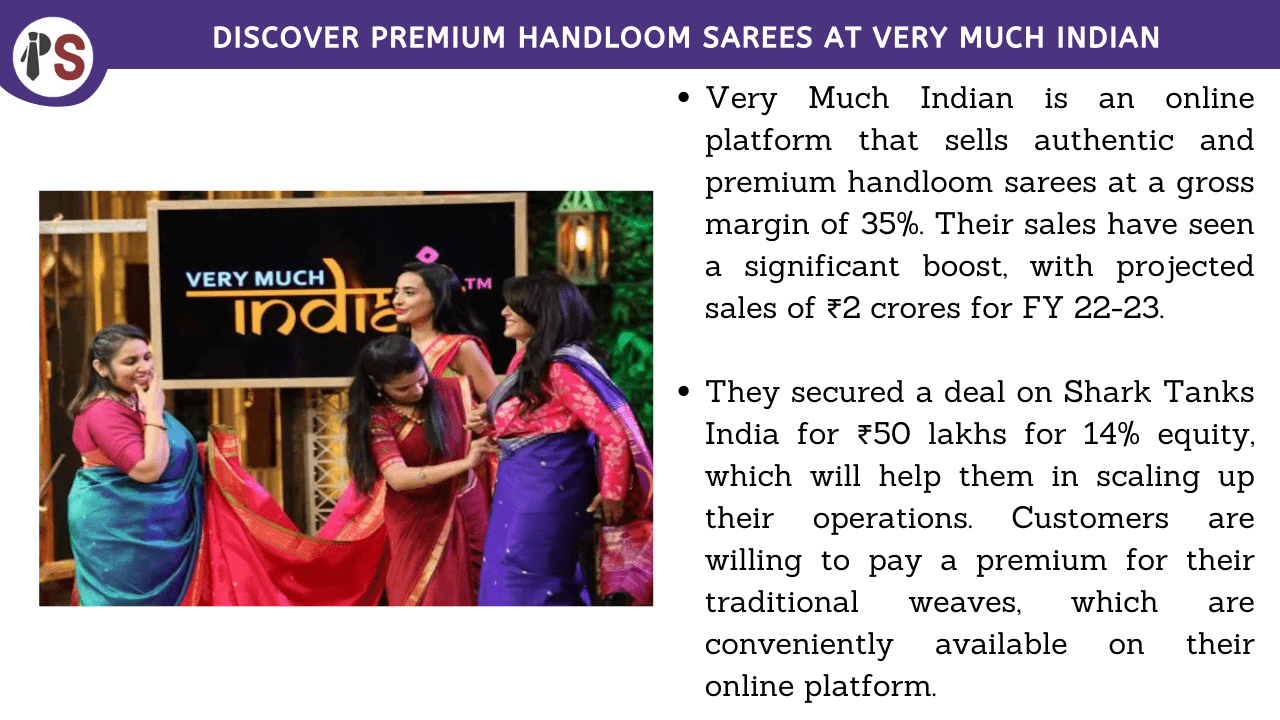
Manish Atri and Slony Baldev Gambhir, two very much Indian founders, started a company called "Very Much Indian." Slony, who was born and raised in Yeola and has an MBA degree, worked as an engineer for 12 years. Her family has a fabric business, which gave her all the connections needed for her venture. Manish and Slony met each other in 2003 while pursuing their MBA degrees and got married in 2008. They both shared a passion for export-import work, which led them to start their own business.
Their company, Very Much Indian, is dedicated to reviving the art of traditional handloom weaving in India. They started by bringing the story of Paithani sarees to the world, which are known as the queen of silk and a part of Indian heritage. The founders realized that people are still unaware of Paithani sarees and that there is a significant gap in the e-commerce market for traditional Indian sarees. They wanted to take forward this weaver’s heritage and make it accessible to everyone.
The aim of the startup "Very Much Indian" is to promote traditional handloom weaving in India and make it accessible to everyone. The founders, Manish Atri and Slony Baldev Gambhir, are passionate about preserving India's rich heritage of handloom weaving and reviving traditional weaves that are slowly being forgotten.
One of the primary aims of Very Much Indian is to bring Paithani sarees to the world. These sarees are known as the queen of silk and are a part of Indian heritage. However, many people are still unaware of their beauty and value. By promoting these sarees, the founders hope to revive the art of traditional weaving and make it more accessible to everyone.
Along with Paithani sarees, Very Much Indian also aims to revive other traditional weaves such as ilkal, khadi, tussars, etc. They want to make these weaves popular again and ensure that the weavers who create them are paid fairly for their work. By doing this, they hope to support the local communities that depend on traditional weaving as their livelihood.
Another aim of Very Much Indian is to become the most trusted traditional Indian saree brand. They want to establish themselves as a reliable and authentic source of handloom sarees, which customers can trust. They believe that by doing this, they can help to create a sustainable market for traditional weaves and support the weavers who create them.
The business model of "Very Much Indian" is based on promoting traditional handloom weaving in India and making it accessible to everyone through e-commerce. The startup works directly with weavers and sources authentic handloom and traditionally woven sarees, which they sell through their online platform. They aim to make traditional weaves popular again by bringing them to a wider audience and supporting the weavers who create them.
To achieve this goal, Very Much Indian has established a business model that supports local communities and ensures that the weavers who create these beautiful sarees are paid fairly for their work. The startup works directly with weavers and pays them directly, cutting out the middlemen who often exploit them. This ensures that the weavers receive a fair price for their work and that the traditional handloom weaving industry in India is sustained.
The target market for Very Much Indian is anyone who appreciates the beauty and value of traditional handloom sarees. The startup aims to make these sarees accessible to a wider audience, including those who may not be aware of their beauty and value. Their online platform makes it easy for anyone to browse and purchase these sarees from the comfort of their own home.
In FY 18-19, the startup recorded sales of ?17 lakhs, which increased to ?20 lakhs in FY 19-20. However, the sales saw a significant boost in FY 20-21, with sales amounting to ?65 lakhs. In FY 21-22, the sales further increased to ?1.5 crores, and the projected sales for FY 22-23 are ?2 crores.
The average ticket size for Very Much Indian is ?10,000, which indicates that customers are willing to pay a premium for authentic and traditional handloom sarees. The gross margin for the startup is 35%, which means that they are able to generate a healthy profit from each sale.
Additionally, the fact that Very Much Indian sells hundreds of sarees per month indicates that they have been successful in creating a sustainable market for traditional weaves. Their online platform has made it easy for customers to browse and purchase these sarees from the comfort of their own home, which has helped to boost sales.
Very Much Indian appeared on Shark Tanks India and asked for ?50 lakhs for 3% equity. Namita was the first Shark to give an offer, proposing ?50 lakhs for 10% equity at a valuation of ?5 crores. Aman later joined the offer. However, Piyush, Anupam, and Veenita did not show interest in the deal.
The founders of Very Much Indian gave a counteroffer of ?75 lakhs for 10% equity of the company at a valuation of ?7.5 crores. After some negotiations, the final deal was closed with Namitha and Aman at ?50 lakhs for 14% equity of the company.
It appears that the founders were successful in securing a deal on Shark Tanks India, which could potentially help them in their growth and expansion plans. The investment of ?50 lakhs will provide the startup with the necessary funding to scale up their operations and reach a wider audience.
At Professional Saathi, we offer a range of business consultancy services that help businesses improve their performance, achieve growth, and overcome challenges.
Copyright 2026 © Created By KTPG PROFESSIONAL SAATHI CORPORATE CONSULTANT PRIVATE LIMITED, All Rights Reserved.
Leave Your Comment